
Future of Total Rewards: Nine Trends to Watch in 2025
In today's rapidly evolving workplace, the concept of total rewards is undergoing a significant transformation. While the fundamental goal of rewards remains unchanged—attracting and retaining talent while driving performance—the workforce dynamics are shifting dramatically.
Factors such as changing demographics, skill shortages, and the increasing assertiveness of employees are compelling organisations to rethink their reward strategies.
As we emerge from the disruptions caused by the COVID-19 pandemic, organisations must adapt their total rewards strategies to meet the diverse needs of a hybrid workforce. This new landscape demands a move away from one-size-fits-all approaches toward more personalised and flexible reward systems.
What are Total Rewards:
Total rewards encompass all the elements an organisation uses to attract, motivate, and retain its employees. This concept extends beyond mere compensation and benefits, forming a holistic package addressing various aspects of employee well-being. Integrated total reward strategies focus on financial, career, physical, social, and emotional well-being, making them central to a future-proof people strategy.
An effective total rewards package may include the following components:
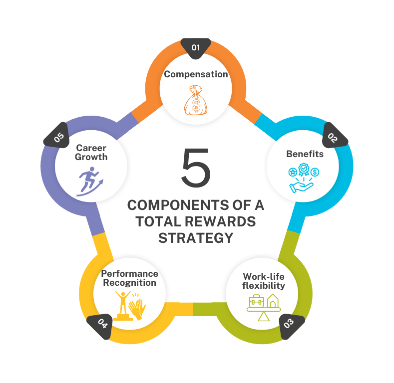
Compensation: All direct financial payments an employee receives, including base salary, bonuses, commissions, stock options, and equity awards.
Benefits: Non-wage employee benefits, such as health insurance, life insurance, retirement plans, and paid time off, are provided in addition to the base salary.
Work-life flexibility: Programs or offerings aimed at promoting a healthy work-life balance, including flexible work schedules, supplemental parental leave policies, remote work options, and employee support services.
Performance recognition: Incentives that acknowledge employee achievements and contributions through awards, recognition programs, and promotions.
Career Growth: Opportunities for employees to develop their skills and advance within the company through upskilling initiatives, mentoring programs, and career development resources.
Why Is Having An Effective Total Rewards System So Important?
An effective total rewards strategy is crucial for businesses seeking to thrive in today's competitive landscape. This approach not only enhances employee satisfaction and engagement but also plays a significant role in attracting and retaining top talent.
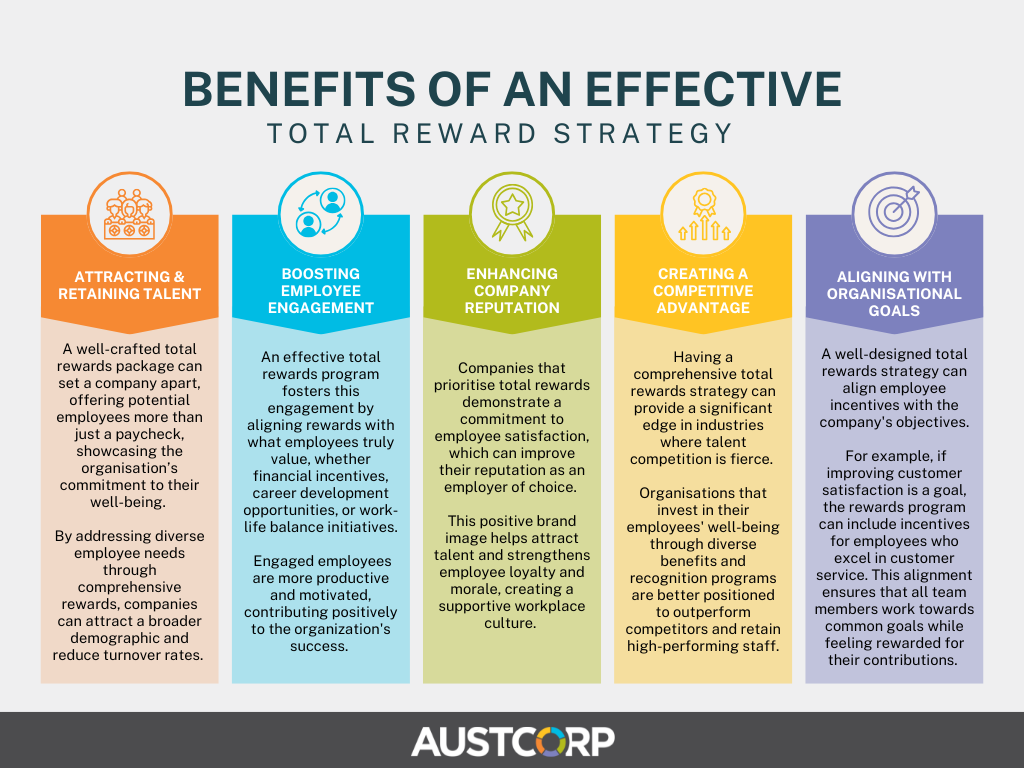
Top 10 Trends for Total Rewards in the Future:
Ditching the One-Sized-Fits-All Approach
Total reward leaders are increasingly pressured to do more with the same budget in a dynamic environment. This would suggest a one-size-fits-all approach in the pursuit of spending efficiency. While this strategy may have been successful, an evolving and still hot labour market demands a more personalised total rewards approach.
Traditional Approach
Historically, companies have provided standardised benefits packages based on the assumption that a uniform offering would meet the needs of all employees. However, this method often leads to several issues:
Employee Dissatisfaction: Employees may feel undervalued and disengaged when benefits do not align with individual preferences and needs.
Inefficient Spending: Organisations risk wasting resources by offering benefits that are underutilised or unappreciated by some employees.
Challenges in Talent Attraction and Retention: Generic benefits packages can hinder efforts to attract and retain talent, particularly among individuals with diverse needs and expectations.
Recognising these challenges, HR leaders now advocate for greater personalisation and flexibility in benefits offerings. The changing demographics of the workforce—characterised by a multigenerational mix—further emphasise the necessity for tailored approaches that accommodate various life stages, family structures, and personal priorities.
Advantages of Personalisation
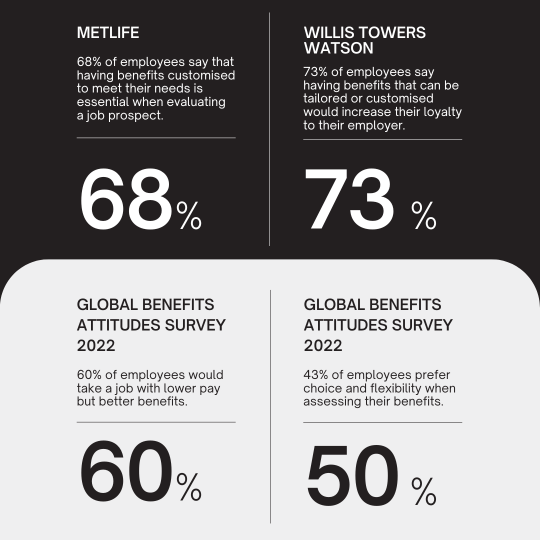
The shift towards personalised benefits yields numerous advantages:
Increased Employee Satisfaction: Employees who can choose benefits that align with their specific needs and life circumstances feel more valued and empowered.
Enhanced Productivity and Engagement: Access to tailored support increases focus and commitment at work, leading to higher productivity levels.
Improved Talent Attraction and Retention: Personalised benefits reflect an organisation's dedication to employee well-being, making it easier to attract top talent in a competitive job market.
Characteristics of an Effective Personalised Total Rewards Strategy
What does an effective personalised total rewards strategy look like? While there is no one-size-fits-all model, successful programs typically share several key characteristics:
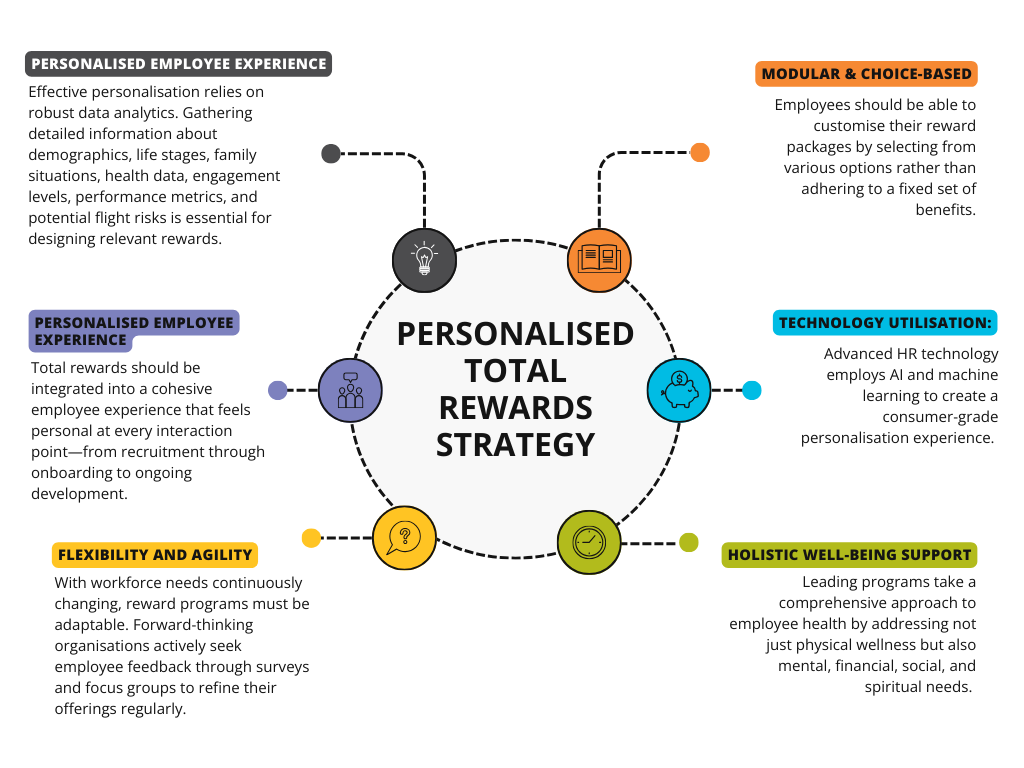
By embracing these strategies and characteristics, organisations can create a truly personalised total rewards system that meets the diverse needs of their workforce while enhancing overall satisfaction and engagement.
Both Unilever and Instacart are great examples of companies that have implemented personalised total reward strategies that are innovative and aligned with employee preferences, significantly improving both companies total reward strategy.
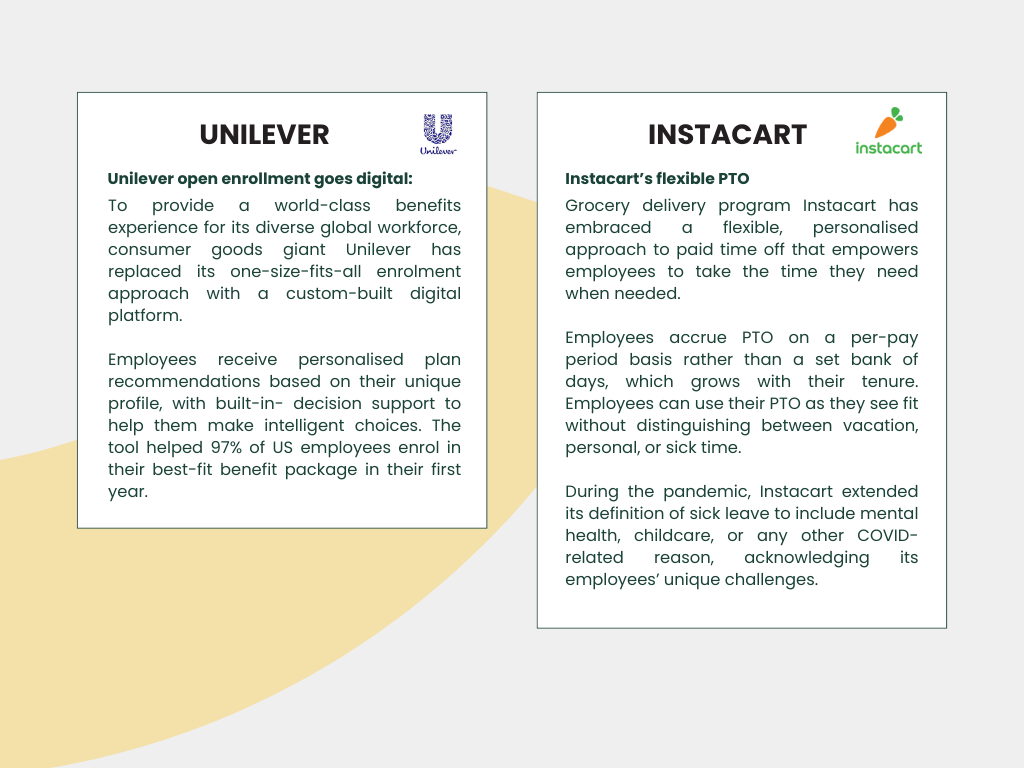
Holistic Well-being Support: Going beyond traditional EAPs
In today's competitive landscape, employee well-being is essential for attracting, retaining, and engaging talent. While mental health is a significant focus, true well-being encompasses physical, emotional, and social dimensions.
Organisations must extend beyond traditional employee assistance programs (EAPs) to effectively support their workforce and develop comprehensive well-being support systems.
Importance of Holistic Well-Being
Holistic well-being is vital for several reasons:
Enhanced Employee Health and Performance: Research indicates that comprehensive well-being initiatives can lead to lower stress levels, better sleep quality, healthier lifestyle choices, and ultimately higher productivity.
Decreased Healthcare Costs: By proactively addressing both mental and physical health, organisations can prevent the onset of chronic conditions that lead to expensive medical treatments later on.
Greater Employee Engagement and Retention: Employees who feel supported in their well-being are more likely to be engaged, satisfied with their jobs, and committed to the organisation.
Attracting Top Talent: A strong emphasis on well-being can differentiate a company in a competitive job market, making it more appealing to potential hires.
Moving Beyond Traditional EAPs
While EAPs provide valuable mental health support, they often fall short in several areas. A holistic approach to well-being includes:
Proactive Interventions: Instead of waiting for issues to arise, effective programs focus on prevention and early intervention strategies.
Broader Scope: Traditional EAPs typically concentrate on mental health but often overlook physical health, financial wellness, and social connections.
Accessibility and Stigma: Some employees may hesitate to use conventional EAP services due to concerns about accessibility or the stigma associated with seeking help.
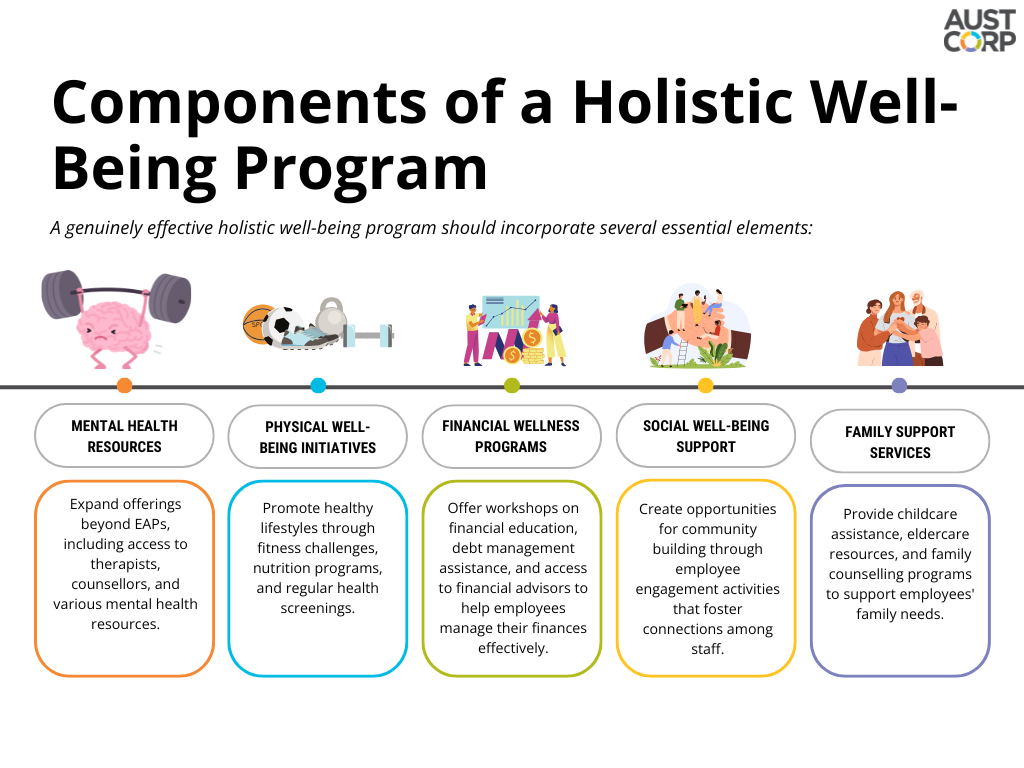
Organisations can create a supportive environment that enhances overall employee satisfaction and loyalty by adopting a holistic approach to employee well-being that goes beyond traditional methods. This commitment benefits individual employees and contributes positively to the organisation's culture and success.
The Shift Towards Hybrid and Remote Work
The Harvard Business Review has described the pandemic as “the greatest workplace disruptor in generations,” one of the most significant changes is the widespread transition to hybrid and remote work. This shift has transformed remote work from a unique benefit into a standard expectation, with 67% of employees considering leaving their jobs if required to return to full-time on-site work.
As organisations adapt to this new reality, they face various challenges related to employee experience, particularly in areas such as remote work support, travel expenses, and regional pay structures.
Supporting Remote Workers
To effectively support employees who work remotely, organisations are implementing several key strategies:
Financial Support for Remote Work: Companies now provide allowances for equipment purchases and enhanced connectivity to improve workplace culture and motivate employees.
Addressing Mental Health: To tackle mental health concerns associated with remote work, organisations conduct regular pulse surveys to gauge employee sentiment and implement digital mental wellness programs to assist those feeling overwhelmed.
National Pay Ranges: There is a growing trend toward establishing national pay ranges that incorporate flexible allowances for expenses related to home office setups and travel.
Opportunities for International Work: Companies increasingly offer employees the chance to work from approved international locations for limited periods. This includes creating global pay structures that reflect the diverse talent pool across different regions.
As organisations navigate these changes, it is essential to create a supportive environment that addresses the unique challenges faced by remote workers while fostering engagement and productivity.
The Demand for Fairness and Equality in Total Rewards
As organisations navigate the evolving landscape of total rewards, the demand for fairness and equality in compensation strategies has emerged as a critical trend.
The Growing Importance of Pay Fairness
With increasing scrutiny from investors, regulators, and employees, companies recognise the importance of addressing pay disparities and enhancing diversity and inclusion (D&I) initiatives. The focus on equitable pay is not just a matter of compliance; it's a fundamental aspect of creating a positive workplace culture that fosters trust and engagement.
Impact on Employee Engagement
Research indicates that organisations prioritising fairness in their compensation strategies can benefit significantly from increased employee engagement. According to Gartner, employees who perceive their workplaces as fair exhibit 26% higher performance levels, while organisations experience a 27% increase in retention rates.
How Companies are responding to this Change?
Pay Transparency: Organisations increasingly adopt transparent pay practices by disclosing salary ranges and implementing equal pay initiatives. This openness fosters trust among employees and enhances overall job satisfaction. Transparency can help identify and rectify pay disparities based on gender, race, or other demographic factors, ultimately leading to a more equitable workplace.
Regular Pay Equity Analyses: In response to legislative changes and stakeholder demands, many organisations conduct regular pay equity audits. These assessments help ensure fairness is embedded in remuneration policies and practices, reinforcing the commitment to equitable compensation.
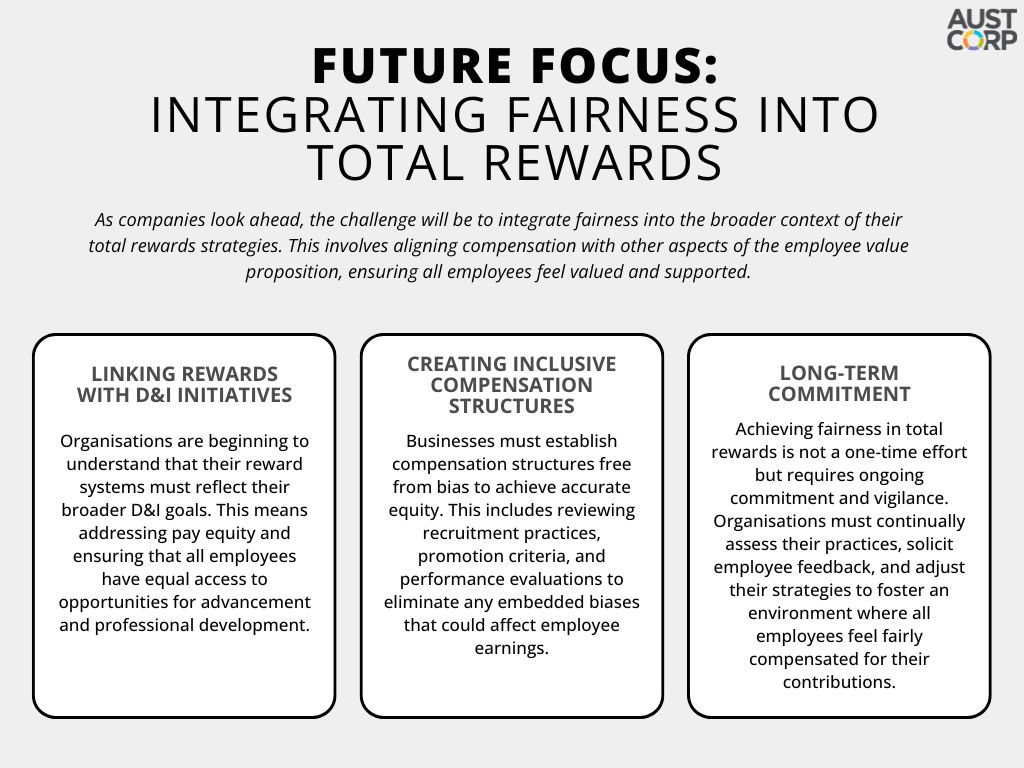
Prioritising Long-Term Career Development
Enhancing employees' career experiences is a strategic approach to boosting engagement without incurring additional labour costs. According to WTW's Global Benefits Attitudes Survey, career advancement consistently ranks among the top five priorities for employees regarding total rewards.
This focus on career growth is vital for individual financial well-being and wealth accumulation whilst significantly promoting diversity in mid- to senior-level positions. Despite the apparent importance of career development, many organisations have yet to capitalise on this potential fully.
A study by WTW involving 1,400 global employers revealed that while most companies have established consistent job levelling and disciplinary frameworks, only 20% have developed comprehensive infrastructures that include
Knowledge Architecture: Skills and competencies
Career Strategies: Philosophies for career movement, clear career paths, and transparency
Career Activation: Training, development, communication, and change management.
This indicates that a significant majority—80%—of global employers have not fully leveraged their career ecosystems.
Emerging Trends in Career Development
As organisations refine their strategies in this area, several key trends are expected to emerge:
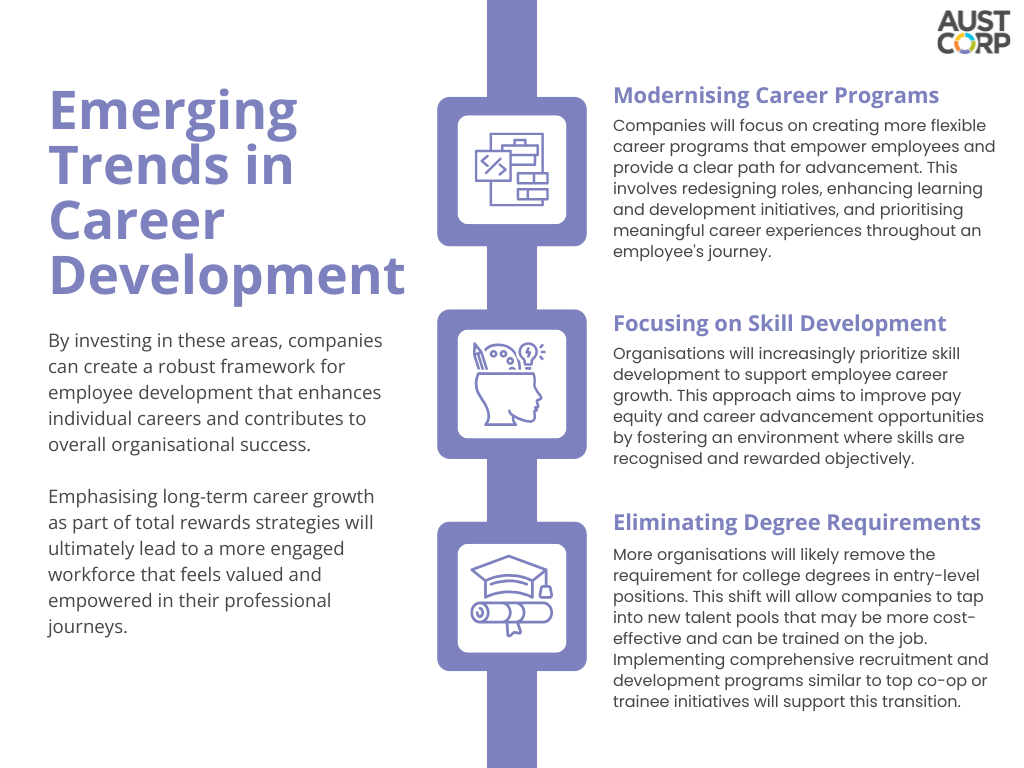
The Growing Need for Recognition
In today's workplace, the demand for timely recognition has become increasingly important, particularly among younger generations. A study by Gallup found that Gen Z and millennials are 73% more likely to desire recognition at least a few times a month than their older counterparts. As Gen Z is projected to make up 27% of the workforce by 2025, organisations must adapt their feedback and recognition practices to foster a culture of continuous appreciation.
The Importance of Recognition
Recognition is essential for employee satisfaction and overall engagement. Research indicates that the lack of recognition is the primary reason many professionals choose to leave their jobs. Organisations with effective recognition programs experience 31% lower voluntary turnover rates and are 12 times more likely to achieve strong business outcomes. Furthermore, about half of the surveyed professionals desired acknowledgment from their immediate managers or coworkers.
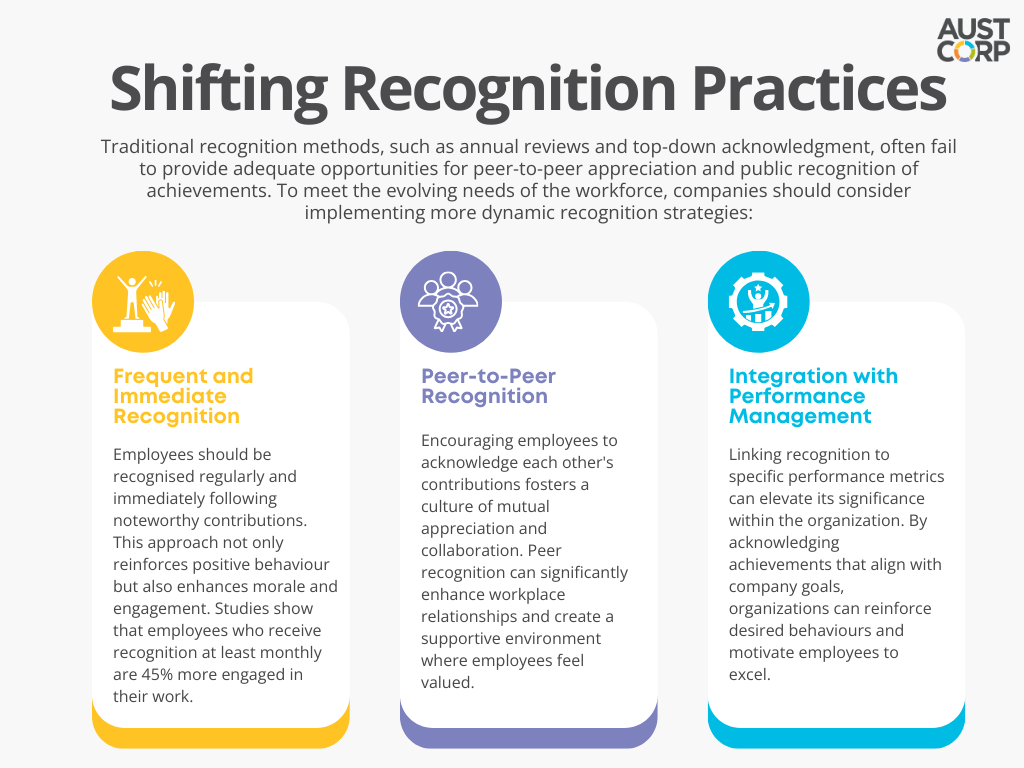
As organisations evolve, the need for effective recognition programs will continue to be a vital aspect of total rewards strategies. By fostering a culture of appreciation through frequent, peer-based, and meaningful recognition, companies can enhance employee engagement, reduce turnover, and ultimately drive better business outcomes.
Utilising Technology to Drive Efficiency
In an increasingly complex landscape, the total rewards function faces rising costs, diverse employee preferences, and the necessity for sustainable strategies to attract and retain top talent. Technology, particularly artificial intelligence (AI), is poised to transform how organisations approach total rewards, enabling them to create personalised experiences that enhance employee satisfaction and engagement.
The Role of AI in Personalising Total Rewards
AI has immense potential to tailor total rewards packages to individual employee needs, optimising both program delivery and spending. Organisations can better understand employee preferences and behaviours by leveraging data analytics and machine learning, leading to more effective reward strategies. Here are several critical applications of AI in the total rewards space:
Personalised Health and Retirement Benefits: Generative AI can analyse vendor information and policy details to provide tailored responses to employee inquiries about benefits. Over time, it can learn from demographic data and individual behaviours to suggest customised health and savings plans, creating a more personalised experience that enhances understanding and appreciation of available options.
Optimized Expatriation and Repatriation: AI can integrate various data sources with employee profiles to recommend suitable mobility support and compensation for expatriates. Additionally, it can facilitate repatriation by predicting opportunities based on employees' skills, experiences, and preferences.
Workforce and Compensation Planning: Reward professionals can utilize AI to synthesize market pay data, demographic information, and risk predictions. This capability allows for proactive workforce planning and real-time pay adjustments in response to talent shortages or shifts in demand for specific skills.
Enhanced Performance Reviews: AI-driven platforms can empower employees to conduct self-assessments and peer reviews. Generative AI can provide guidance to ensure evaluations are objective, constructive, and aligned with organisational goals while keeping managers involved.
Sentiment Analysis: By analysing digital communication patterns, facial expressions, and verbal cues, AI can gauge team dynamics and overall workforce sentiment. Organisations can use these insights to improve collaboration, communication, and other factors influencing team performance.
Integrating Technology into total rewards strategies represents a significant shift in how organisations attract, motivate, and retain talent. By harnessing the power of AI and data analytics, companies can create personalised experiences that enhance employee satisfaction while optimising costs.
Increased Emphasis on Optimising Labor Costs
Recent salary budget data indicates that wage increases are at their highest in two decades. Many companies are now focusing on "right-sizing" their salary budgets to manage costs effectively. However, rising global healthcare expenses and macroeconomic uncertainties present significant challenges for employers in 2024.
Simply shifting these costs onto employees is not a viable solution, especially as workers seek better ways to manage their financial burdens.
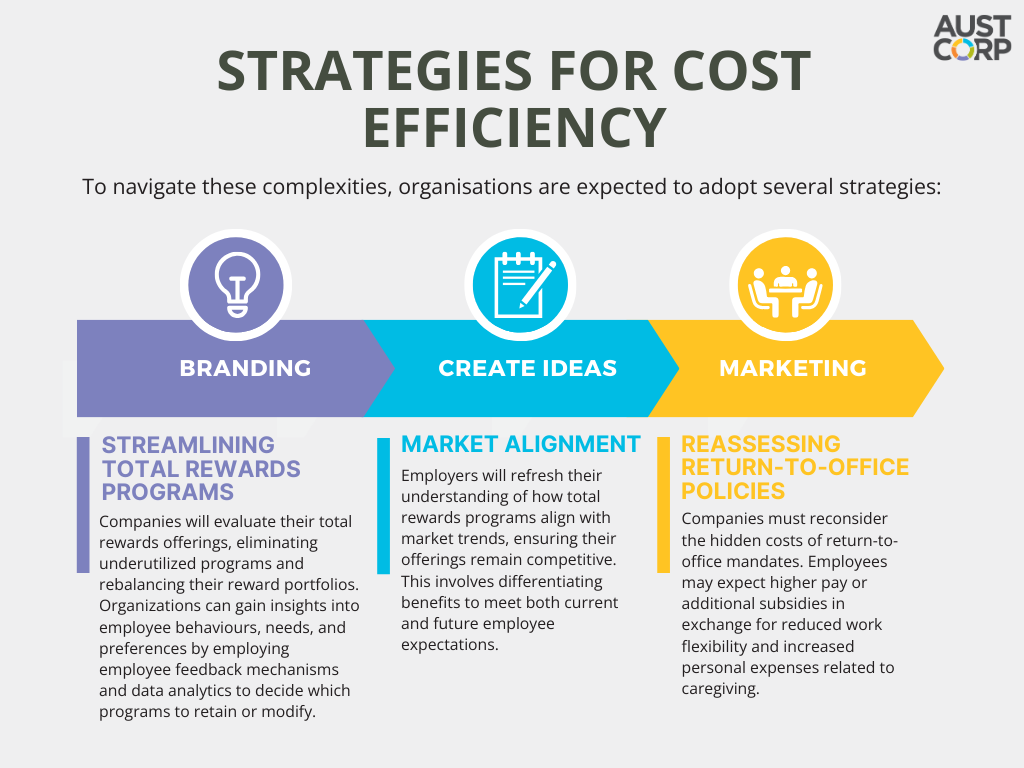
Prioritising Employee Well-Being
In light of ongoing economic pressures, organisations will also focus on the costs associated with employee health and well-being. By reallocating resources towards programs that enhance resilience, productivity, and overall well-being, companies can mitigate the effects of presenteeism and improve workplace morale. For instance, recognising loneliness as a significant health risk can lead organisations to implement initiatives to foster employee social connections.
Creative Solutions for Total Rewards Appreciation
With financial constraints in mind, organisations will seek innovative methods to enhance the perceived value of total rewards without significantly increasing expenditures. This could include:
Financial Education: Providing employees with resources to improve their financial literacy can empower them to make informed decisions regarding their compensation and benefits.
Personalised Communication: Utilizing digital platforms to tailor communication about total rewards can help employees better understand the value of their compensation packages, particularly during significant life events.
Demonstrating ROI on Total Rewards
A common challenge for employers is demonstrating the return on investment (ROI) of their total rewards programs. Technology can be crucial in providing insights into employee engagement and satisfaction. Organisations can create a comprehensive picture of how employees perceive their rewards by combining employee surveys with engagement metrics—such as page views, video interactions, and app usage.
A multidimensional approach is essential to capture emotional responses; employees can engage with the system while still feeling undervalued by their employer. By utilising advanced analytics tools, organisations can better understand employee sentiment and make data-driven decisions that enhance individual satisfaction and overall organisational effectiveness.
Increased Emphasis on Clear Communication of Total Reward Strategies
Effective total rewards communication is becoming increasingly vital in today’s competitive job market. Employees may be tempted to switch employers for minimal increases in base salary, often overlooking the broader value of their total rewards package. Alarmingly, many employees lack awareness of the full extent of the benefits their companies provide despite significant investments made by organizations in these offerings.
The Importance of Total Rewards Statements
One effective method to enhance employee understanding is through Total Rewards Statements (TRS). These statements offer a transparent overview of the total value of benefits and compensation the employer provides. By consolidating this information in one accessible location, TRS can significantly boost employee engagement with benefits and overall well-being initiatives, ultimately aiding retention efforts.
Bridging the Awareness Gap
Despite many organisations offering attractive benefits—such as flexible work arrangements and skills development—there is often a disconnect between what employers provide and what employees perceive. For instance, Aon’s Rising Resilient Report highlights that while 88% of employers offer flexible work options, only 39% of employees believe they can access these benefits.
This gap underscores the need for clear communication about available rewards. When employees fully understand the value of their total rewards, they tend to feel more valued, leading to increased engagement and productivity.
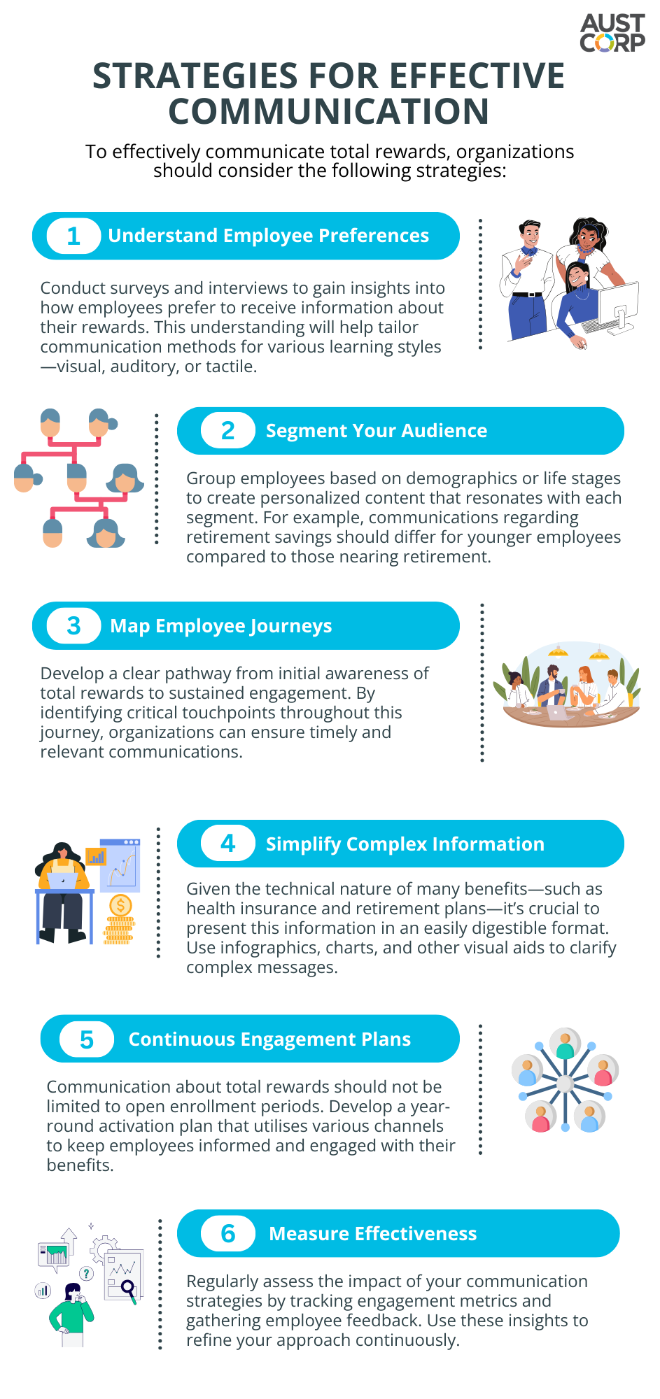
Clear communication regarding total rewards is essential for ensuring employees recognise their compensation packages' total value. Organisations can foster a deeper understanding and appreciation of their total rewards offerings by implementing targeted strategies that address employee preferences and simplify complex information. This proactive approach enhances employee satisfaction and strengthens retention and engagement in an increasingly competitive labour market.
Conclusion
The future of total rewards is evolving rapidly, focusing on personalisation, holistic well-being, and technology-driven solutions. As organisations adapt to changing workforce dynamics, they must prioritise fairness, personalisation, and effective communication of their total rewards strategies.
By embracing these trends, companies can create more engaging, flexible, and competitive reward packages that attract and retain top talent in an increasingly complex labour market. To stay ahead in this dynamic landscape, it will be crucial for organisations to continually reassess and refine their total reward approach.
Read More Hiring Tips and Guides
Hungry for more hiring & HR advice? Check out these relevant blogs to further enhance your hiring strategies:
Talent Mapping: The Ultimate Guide to Strategic Workforce Planning
The ROI of Employer Branding: How To Create A Compelling Employer Brand
Top 10 Workforce Trends to Watch in 2025: Shaping the Future of Work
